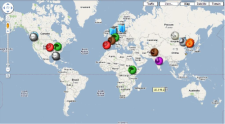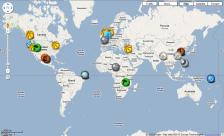
Although this is a rather belated nusing about a panel topic in this year’s AussieCon IV in Melbourne, I think the topic is sturdy enough to stand the test of time (Q.E.D.).
Let’s start with William Wordsworth:
A single Field which I have looked upon,
Both of them speak of something that is gone:
The Pansy at my feet
Doth the same tale repeat:
Whither is fled the visionary gleam?
Where is it now, the glory and the dream?
The panel at AussieCon IV was “Implications of Immortality”, and the panel description was:
Immortality is a common element in science fiction and fantasy, but what would it actually be like?
What would you need to do and think about if you were immortal? How would society need to change if we were all immortal?
In a world where we are no longer faced with an end to our lives, how would human society change?
In general, I was rather disappointed by this panel (audio transcript here, courtesy of the Singularity Institute for Artificial Intelligence), as it mostly repeated SF and fantasy’s clichés about immortality, and didn’t really reach any interesting, new (let alone ground-breaking) conclusions.
So, with this panel, and a number of internet articles about immortality — Annalee Newitz on io9 (Four Arguments against Immortality), Jason Stoddard (Four Arguments FOR Immortality), BBC’s recent Do You Really Want to Live Forever?, an interview on I Look Forward To about the possibility of immortality or extreme longevity with Aubrey de Grey and David Brin (When Will Life Expectancy Reach 200 Years?), Edward Cheever’s In Defense of Immortality — in mind, I’m going to try to deconstruct a number of faulty assumption about extreme longevity.
You may have noticed that I’m not calling it ‘immortality’ anymore. Well, I think immortality is in the same class as Utopia, infinity and perfection: a great destination to travel to, but one that can never be reached. Yet we should try, nevertheless. While immortality is an unreachable ideal, the effort of reaching it will bring huge progress and immense advantages. So let’s be a tad more realistic and call it the quest for longevity, or extreme longevity.
Problem is, a lot of people think we shouldn’t be on this quest anyway, because of several misconceptions. Let’s go through them:
(1): Humans are not ‘wired’ for immortality or extreme longevity.
As (panel member) Will McIntosh said (I’m paraphrasing here): “the human psyche is not wired for immortality: in almost every thing we do lies the shadow of our oncoming demise.” However, this assumes that humans will not change. I think humans will change. Actually, humans are already changing, and have been changing throughout history.
The problem with a lot of thinking in science fiction is that it often takes one — and only one — idea and tries to imagine its impact on humans and/or society while assuming that the latter (humans and society) do not change, or only minimally through that one single idea. In reality, though, society is an immensely complex web of connections that all influence each other.
Therefore, as such, both humans and society have changed over the years, also (among many other things) in regards to life expectancy. Life expectancy has increased (and is still increasing), and we have learned to live with that. Less than two centuries ago we would become, on average, 37 years old. Our ‘productive’ life span was 20 to 25 years. Now we get, on average, 77 years old, with a ‘productive’ life span of over 40 years.
Indeed: right now we have more ‘productive’ years than we actually lived 200 years ago. And if someone had said, back in 1810, that humans aren’t wired to live 80 years, most people would have agreed.
Well, immortality won’t happen overnight: it will take time to develop much longer lifespans, followed by extreme longevity. Time enough for humans to change, and to adapt successfully to a much longer life. People have been changing all the time — albeit at a much higher rate in the past 100 years — and have been able to cope. Why shouldn’t we be able to do so in the future?
Imagine someone in 1810 saying that in 200 years people would travel around the world regularly, that we would live twice as long, and that we would be able to talk to people at the other side of the globe through a device that weighs less than a book. Now imagine depriving your 8-year-old kid from her/his gameboy, cell phone, or internet connection.
I’ve been discussing this with (Guest of Honour) Kim Stanley Robinson at the bar right after the panel, and he thought that such thinking — humans will remain the same while the world around them changes — is ‘a failure of the imagination’. I agree: by the time extreme longevity is possible, we will have developed the right mindset for it.
However — as Annalee Newitz proposed on io9 — we may change so much that we’re no longer human. Well, try to define ‘being human’ first. Then compare that 21st Century definition with that of a 19th Century one: there will be quite a number of differences. As mentioned, humans change, and the yardstick that ‘defines’ humanity changes, as well.
Of course, Annalee voiced the fear that we might become emotionless monsters as we develop extreme longevity. I disagree: there have been monsterous humans throughout history, Stalin, Hitler and Pol Pot just a recent addition to a long, long list that stretches back to the dawn of human memory. Yet we have always overcome these monsters: why shouldn’t we be able to do that in the future?
I’ll even go a step further: it makes much more sense to be a ruthless dictator and burn all your bridges behind you if your lifespan is short. Conversely, if you realise that you have several centuries to go, it makes little sense to rampage an ecology that you need to support your much longer life. Even beter, as longer lifespans (or even extreme longevity) spread throughout the world population (and it will: see point 3 of this post), then it is in everybody’s best interest to weed out those so hell-bent on power that they are willing to destroy a very long term infrastructure (like say, Gaia) for it.
(Not to mention the non-starter ‘Whatever body you’re in, there you are’. Sorry: last time I looked all of us are constrained to one, and one body only. I personally will highly appreciate it if it lasts much, much longer.)
(2): Immortality is boring: I will be stuck with the same dead-end job/uninteresting life/pointless existence forever.
As mentioned, immortality is an idealised concept: it is an endpoint that we might approach asymptotically, hence it will not happen overnight. Still, quite a few people (some of which were in the audience of the panel) seem to think so. One even literally mentioned that ‘immortality would be a kind of eternal hell as she would be stuck with the same dead-end job forever’.
In the grander scheme of things, holding a steady job throughout one’s carreer may already be a passing fad in times to come. Yes, in times of yore one — before the 20th Century almost always a man — acquired (either through education, experience, inheritance or a combination thereof) a job or profession and stuck to it for the rest of one’s productive life. Exceptions acknowleged, of course, but those were few and far in between.
But nowadays, things are different, completely different, just check out this video: “Shift Happens: Bringing Education into the 21st Century”

A few price quotes:
—1 out of 4 workers today is working for a company they have been employed by for less than one year
—More than 1 out of 2 are working for a company they have worked for for less than five years
…the top 10 in demand jobs for 2010 did not exist in 2004
—We are currently preparing students for jobs that don’t yet exist…
…using technologies that haven’t been invented…
…in order to solve problems we don’t even know are problems yet
Basically, the amount of jobs that you can hold for your complete productive life is shrinking: a ‘job-for-life’ is increasingly becoming a feature of the past.
Therefore, in order to keep making a living people already need to keep educating themselves, constantly. I know what I’m talking about: I train people in my company’s product, and I need to stay updated. I teach and I learn, all the time.
Some people see this as a bad thing: such people like to keep on doing the same things, ad nauseam until their pension. This, though, is increasingly not an option anymore.
I see this as an interesting, and potentially good development: now people (must) keep developing themselves, learning new things, broadening their horizons, expanding both the depth and the breadth of their knowledge.
Isn’t this an exhilarating convergence? As life expectancy grows, life is becoming more interesting, as well. Maybe we are already on the right track to leading longer and more fullfilling lives by being able to change constantly?
Now before some of you — like Athena Andreadis (see point 2) — start to argue that the memory and learning capacity of a human brain is limited, let me make a bet (for a drink, or a symbolic amount like one Euro): I bet that before people live so long that their brain capacity is insufficient to store, work or even understand all the knowledge they build up in their extended lifetime, that there will be not one, but a variety of competing options to extend that brain capacity. For example, check out Andy Clark’s article “Out of Our Brains” in the New York Times (via Futurismic).

(3): Only the superrich will have immortality, and will keep it ‘locked away’ from the rest of the world.
Or point 4 (“We’ll have to deal with the immortality divide”) of Annalee Newitz’s io9 post.
This argument assumes that:
- there is an immediate development that changes life expectancy immensely;
- that this — nearly instantaneous — development is so expensive that only the superrich can afford it;
- that the superrich elite will be able to keep this development completely to themselves;
Personally, I suspect it’s extremely unlikely that a ‘silver bullet’ for highly increased longevity (let alone extreme longevity and forget about immortality) will be developed overnight. It’s hugely more likely that longevity will increase in leaps and bounds, with all kinds of dead alleys, red herrings and fool’s gold (to deftly mix metaphors) along the way. The way almost all scientific research does. The way longevity has been increasing already.
So while I do expect that there will be new treatments that lengthen lifespan, I do, very strongly, suspect that these will not stay with the ultra-healthy among us for long.
Consider: there are about a thousand billionaires in the world right now. There are about 10 million millionaires. By 2030, about two billion new people may join the world middle class (via Goldman Sachs: opens PDF file): adding this to the 1.5 billion middle class people as of 2010, this will total 3.5 billion middle class incomes.
So a big pharmaceutical company would keep its product exclusive to the happy thousand? Even after it has earned back its development costs? And will ignore the 10 million plus other, rich customers? And once the treatment has been proven to work for over a million people, they will not eventually want to sell it to almost 4 billion more customers? That’s not how capitalism works, last time I looked.
Then there is the case of the ghost having escaped the bottle: in science, once something has been proven to be possible, it can be replicated. If an experiment can’t be verifiably repeated, it’s not true science. So if it’s possible (extreme longevity, even immortality) then competing scientists will know that, and they will redouble their efforts to reproduce the same result.
Once a certain development’s time has come, it shows up everywhere. Tesla’s and Marconi’s dispute about who invented radio first is one example. The rise of aviation (once the Wright brothers delivered proof of concept) is another. There are countless more. And these technologies, once new, are now available to almost everybody: radio (is become obsolete by the internet, another technology initially developed for the hapy few — the Pentagon or CERN— available to all), avaition, the utmost majority of modern medicine. Once the cat is out of the bag…
Competition, the desire to sell it to as much markets as possible, the fact that it can be done all will make sure that it eventually becomes available to all. Inevitably.

(4): (a) Biological immortality or biological extreme longevity is impossible; and (b): mind uploading is a pipe dream.
Check out this interview with Aubrey de Grey and David Brin: When Will Life Expectancy Reach 200 Years?
The above gentlemen are talking about a life expectancy of 200 years. While that may sound already unrealistic to some, and a bit unambitious to others (what is 200 years in the face of extreme longevity?), there is a tipping point. As Ronald Bailey explains in his Liberation Biology:
“Researcher reported in the April 2002 issue of Science that life expectancy has been increasing at about two and a half year per decade for the past 160 years. Demographers such as Olshansky, they note, have been consistently wrong in predicting an upper limit to this trend. In 1928, for example, demographer Louis Dublin predicted that average life expectancy in the United States would never exceed 64.75 years. Today it is 77.6 years.”
“At this rate of improvement, the authors of the Science report conclude that “record [average] life expectancy will reach about 100 in six decades”.”
It gets better:
De Grey offers a scenario in which efforts to achieve radical life extension reach “actuarial escape velocit (AEV)”. Recall that for the last 160 years, average life expectancy has increased by two-and-a-half year per decade. What if increases in life expectancy rose at a rate of ten years or more per decade? “The escape velocity cusp is closer than you might guess,” claims de Grey. “Since we are already so long lived, even a thirty percent increase in healthy life span will give the first beneficiaries of rejuvenation therapies another twenty years—an eternity in science—to benefit from second generation therapies that could give another thirty percent, and so on ad infinitum”
Yes, the same Aubrey De Grey interviewed above. The above quote can be found online on PLoS Biology: ’Escape Velocity: Why the Prospect of Extreme Human Life Extension Matters Now’.
Extreme longevity in this century? Maybe even in our lifetime?

As noted above, David Brin disagrees, as I’m sure many of you do. “There are way too many obstacles,” I hear you say, “there is no low-hanging fruit.” Further cue to David Brin:
All advances to date have involved allowing ever-greater percentages of humanity to hit the “wall” at age 100, and maybe coast a few years beyond. Getting beyond that will require either;
1) THOROUGH nanotechnology, applied down at the INTRA-cellular level, or
2) genetic recoding to enhance repair capabilities in new ways (good news for our great grandchildren, maybe), or
3) gradual replacement of failing parts and systems with prosthetics, or
4) uploading.
Oh, I am willing to be proved wrong, but all of these seem much harder than the zealots think.
a) The intra-cellular world is the next frontier. It now seems huge, complex, involving massive amounts of computing. Will you flood the INSIDES of cells with nanomachines? Good luck.
b) We haven’t a clue how to do #2.
c) #3 will happen in phases. But when the brain fades… well,… see #a
c) re #4 — see #a
(Emphasis mine.)
The Aubrey De Grey/David Brin interview was posted on November 25, 2010. Three days later, this news came out: “Harvard Scientists Reverse the Ageing Process in Mice“. Price quote:
The Harvard group focused on a process called telomere shortening. Most cells in the body contain 23 pairs of chromosomes, which carry our DNA. At the ends of each chromosome is a protective cap called a telomere. Each time a cell divides, the telomeres are snipped shorter, until eventually they stop working and the cell dies or goes into a suspended state called “senescence”. The process is behind much of the wear and tear associated with ageing.
At Harvard, they bred genetically manipulated mice that lacked an enzyme called telomerase that stops telomeres getting shorter. Without the enzyme, the mice aged prematurely and suffered ailments, including a poor sense of smell, smaller brain size, infertility and damaged intestines and spleens. But when DePinho gave the mice injections to reactivate the enzyme, it repaired the damaged tissues and reversed the signs of ageing.
This sounds very much like ‘genetic recoding to enhance repair capabilities in new ways’. And yes, it is only applicable to mice (“Repeating the trick with humans will be more difficult”), and developing a method that works for humans might still be a long way off. Yet, we have gone from “We haven’t a clue how to do #2” to “We have found a method that works in mice”.
So while extreme longevity is probably not around the corner, I believe that it is possible. At the very least we can expect that our life span will continue to increase in the future, as it has done for the past 160 years. Very probably with more than 2-and-a-half year per decade. I strongly suspect that auctuarial escape velocity will not be a matter of if, but of when.
And then extreme longevity is a fact of life.
Finally, as to (b): mind uploading is a pipe dream;
I don’t know.
On the one side, the human brain is an immensely complex organ, of which we still understand very little (even though our knowledge is increasing). It’s also very unclear if a mind based so intimately in a biological body can be ‘transported’ or ‘copied’ to a non-biological mainframe, without considerable losses in either functionality or memory or both.
On the other side, if Moore’s Law holds (and it’s not showing any signs of slacking up yet), then by the time mind uploading is possible — even when it happens only a few decades from now — then there will be a hell of a lot of computing power available to upload into.
Apart from that, if uploading becomes possible, there is still the problem that, in all likeliness, it will be copying your mind into a different substrate, leaving the original behind to die. That’s why I prefer developments of extending lifespan of our biological bodies: it seems the better bet.

Picture credits:











































